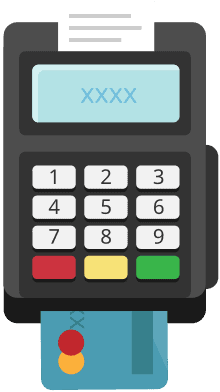
Get Matched With POS Software
Take our short quiz to get matched with the best point-of-sale software for your unique business needs. Instant results, no phone number or email required.
Start Quiz💳 Save money on credit card processing with one of our top 5 picks for 2025
You might be surprised to learn there are a lot of businesses that do well in a recession. Our guide lays out some recession-proof business ideas to get you started.

Tough economies pose special challenges to entrepreneurs looking to start recession-proof businesses. With Statista now projecting a 38% likelihood of a recession in the US by November 2023, a literal recession in the near term is far from guaranteed. Still, the economic disruptions of the past few years show that it pays to be prepared for challenges when storm clouds gather.
Would-be business owners braving the economic headwinds to start a new business need to keep two essential truths in mind:
Table of Contents
Recession-proof businesses tend to have one thing in common: They provide products and services that are always in demand, regardless of economic conditions.
Demand for luxury goods can actually rise in a tough economy in certain instances as people seek familiar comforts during uncertain times. The “lipstick index” posits that spending on accessible luxury items increases during recessions even as overall retail spending declines. A 2013 Euromonitor International study examining consumer behavior during the 2008-09 Great Recession found little support for this hypothesis in regards to lipstick itself but found that other categories of “affordable luxury” spending did, in fact, rise during this period.
Good businesses to start in a bad economy include the following:
While some industries are inherently more recession-proof than others, this doesn’t necessarily mean that you should defer your plans to start a new business if it doesn’t fall under one of these categories. Recessions tend to have a culling effect on less sustainable businesses, so the ones that do well in a downturn will primarily be those that stay agile, efficient, and creative — qualities that will serve them well during boom times as well.
The COVID disaster changed our perception of what an economic disruption can look like and what makes for a recession-proof business. Consider the fate of businesses in the retail sector — a sector considered particularly vulnerable to economic downturns.
Granted, this wasn’t a traditional recession but a different kind of disruption. However, it highlighted the importance of adapting to new conditions. Retailers that could not adapt to new realities struggled or went under. Retailers that pivoted to meet consumers where they were survived and thrived.
What did this mean in concrete terms? It meant accepting NFC (contactless) payments in-store to minimize contact, keep the lines moving, and give customers some peace of mind. It meant offering online sales, either through social media links or a full online store. It meant offering customers the ability to pick up purchases curbside or offering home delivery. In some cases, it meant offering customers a full omnichannel payments solution.
Adopting one or more of these measures helped retailers meet evolving consumer expectations. While future economic disruptions may look different, the need to adapt and evolve to accommodate the changing circumstances of your customers will remain of supreme importance.
From business software to payment processing, the right business tools can help you run your new business more efficiently and make you more adaptable and creative than the competition.
If you plan to start a new eCommerce business, you’re probably aware of what a good online selling platform can do for your venture. For brick-and-mortar merchants, the benefits of offering your customers an online purchasing option extend beyond the obvious. As the economy slows and gas prices rise, customers who may otherwise be content making in-store purchases might prefer to save on gas by purchasing online instead.
Whether you’re a small-time seller or a more established merchant with multiple locations, our article detailing the best eCommerce platforms has options that fit your business needs.
Traditionally, merchant account providers would lock you into a long-term contract (usually with an early termination fee) in exchange for payment processing. This practice was never beneficial for merchants, but the uncertainty that comes with a potential recession means that you really want to avoid signing a long-term contract for merchant services right now, if possible. Thankfully, month-to-month agreements are now commonly offered by more reputable processors.
Regardless of the economic climate, new merchants often find that an all-in-one third-party processor, also known as a payment service provider (PSP), can be a better business fit than a traditional merchant account provider. There are two reasons for this:
Though no single processor is best for all business types, the PSP we most often recommend to new businesses is Square. As our Square review explains, Square combines flat-rate payment processing with industry-specific point of sale systems, an online store builder, invoicing, real-time reporting, and much more.
Once your sales volume reaches a certain level (this inflection point varies depending on your business type, but it tends to be $5K to $10K per month), it may be more cost-effective for your business to switch to a full merchant account provider that offers interchange-plus pricing. However, with Square, some higher-volume businesses may qualify for custom processing rates.
Project management software can benefit your new business by organizing tasks, team communication, and resources. These tools can help your business stay lean, efficient, and responsive as it grows. While this is particularly helpful during a recession, it certainly doesn’t hurt during boom times either!
New businesses and startups will particularly want to check out some free project management solutions. These apps offer free subscriptions for those just starting out, and you can upgrade to a paid plan when your business needs become more complex.
Top-tier accounting software is another tool that can save your business considerable time and money, leaving you with more of both to spend on building your new business. These apps help track your expenses and financials while giving you the information you’ll need for tax season for considerably less than you’d spend hiring an accounting firm.
Check out our summary of the best accounting software for small businesses to get a sense of your best options. Startup owners will be pleased to see the free options on offer. Other accounting apps offer free or low-cost subscription plans along with pricier, more fully-featured options that let you scale the software with your business as it grows.
Get in touch with a real human being on the Merchant Maverick team! Send us your questions, comments, reviews, or other feedback. We read every message and will respond if you'd like us to.
Reach OutGet in touch with a real human being on the Merchant Maverick team! Send us your questions, comments, reviews, or other feedback. We read every message and will respond if you'd like us to.
Reach Out
Let us know how well the content on this page solved your problem today. All feedback, positive or negative, helps us to improve the way we help small businesses.
Give Feedback
Want to help shape the future of the Merchant Maverick website? Join our testing and survey community!
By providing feedback on how we can improve, you can earn gift cards and get early access to new features.
 Experience competitive rates, excellent customer support, and a fast & easy claim process. Request a free analysis today.
Get Started
Experience competitive rates, excellent customer support, and a fast & easy claim process. Request a free analysis today.
Get Started
Help us to improve by providing some feedback on your experience today.
The vendors that appear on this list were chosen by subject matter experts on the basis of product quality, wide usage and availability, and positive reputation.
Merchant Maverick’s ratings are editorial in nature, and are not aggregated from user reviews. Each staff reviewer at Merchant Maverick is a subject matter expert with experience researching, testing, and evaluating small business software and services. The rating of this company or service is based on the author’s expert opinion and analysis of the product, and assessed and seconded by another subject matter expert on staff before publication. Merchant Maverick’s ratings are not influenced by affiliate partnerships.
Our unbiased reviews and content are supported in part by affiliate partnerships, and we adhere to strict guidelines to preserve editorial integrity. The editorial content on this page is not provided by any of the companies mentioned and has not been reviewed, approved or otherwise endorsed by any of these entities. Opinions expressed here are author’s alone.
 Experience competitive rates, excellent customer support, and a fast & easy claim process. Request a free analysis today.
Get Started
Experience competitive rates, excellent customer support, and a fast & easy claim process. Request a free analysis today.
Get Started